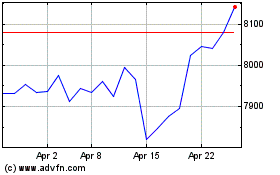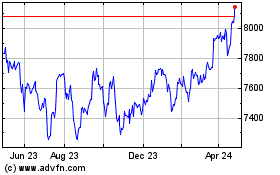By Ira Iosebashvili
One of the most popular emerging-market trades is in a Middle
Eastern currency that was shunned by investors just a year ago.
Large bond-fund managers such as T. Rowe Price Group Inc. and
J.P. Morgan Chase & Co. and other investors have poured money
into Egyptian government debt this year, following a sharp drop in
the Egyptian pound that made the debt more attractive to foreign
buyers. About 60% of the 70 local-currency bond funds tracked by
data group eVestment held Egyptian debt at the end of the third
quarter.
A buyer of government bonds denominated in the Egyptian pound
can collect around 18% annually on the country's three-month
Treasury bill as of late last week, due to moves by Egypt's central
bank, which has increased interest rates sharply over the past
year. By comparison, the yield on a three-month U.S. Treasury bill
was 1.225%, as of Friday.
The country's cash-hungry central bank has long guaranteed that
portfolio managers would be able to withdraw their money at will,
allaying a key concern faced by players in smaller, less liquid
markets, where it can be difficult for foreign investors to convert
their money back into their original currency.
The rush to own Egypt's bonds, rated six notches below
investment grade by Moody's Investors Service, shows how far
investors will go to harvest returns in a world where yields in
developed markets remain near historic lows. This year has seen
money managers pile into the debt of countries where both payouts
and risk are comparatively high, including Argentina, the Czech
Republic and Tajikistan.
"Egypt is one of those idiosyncratic stories that everyone is
very desperate for these days," said Denise Prime, co-manager of
the emerging-market bond portfolio at GAM UK Ltd. Her fund holds
Egypt's debt, which it purchased at the beginning of 2017.
But some investors fear the trade could also reverse suddenly
for a variety of reasons, including any rise in political
instability, faster than expected tightening by major central banks
that could make the debt of emerging countries less appealing, or
other developments that could dent appetite for risky
investments.
Because Egyptian bonds are thinly traded, any bad news that
causes many investors to sell at once could overwhelm the market
and cause prices to plunge.
"The trade is a little bit exhausted," said Jan Dehn, head of
research at Ashmore Group, which owned Egypt's local currency bonds
earlier this year. "I think it's on its last legs." Mr. Dehn
wouldn't say whether his firm still had a position in the
bonds.
While high yields have attracted foreign investment, they also
crimp borrowing and stifle growth. The central bank may soon need
to start cutting borrowing costs to keep the economy humming.
Some money managers have been happy to take profits. Jim
Barrineau, co-head of emerging-market debt at Schroders, said
concerns over high inflation pushed him recently to sell Egyptian
local currency bonds his firm had invested in earlier this year.
Inflation stood above 30% at the end of October.
"It was a very good trade," Mr. Barrineau said. "Better to sell
now than...when everyone is trying to get out at once."
Investors began eyeing the pound after the currency plummeted
50% after Egypt's central bank in November 2016 scrapped a peg of
8.8 pounds to the U.S. dollar ahead of a $12 billion loan from the
International Monetary Fund.
To support the pound and combat inflation, the central bank has
raised key interest rates by seven percentage points over the past
year, making Egypt's local debt more attractive to yield-hungry
foreign money managers.
The country's newly flexible exchange rate, fiscal deficit
reductions and other changes won praise from the IMF, which has
already disbursed two tranches of its loan, totaling some $4
billion.
Egypt's improving macroeconomic fundamentals and sky-high rates
made it a tempting proposition for money managers. Foreign capital
flows to Egypt hit a record high of $21.1 billion in the first half
of this year -- compared with $7.4 billion in the first half of
2016, data from the Institute of International Finance show.
S&P Global Ratings on Friday revised its outlook on Egypt to
positive from stable, citing a strengthening economy and the
country's growing foreign exchange reserves, which rose to $36.7
billion in October from $19 billion a year ago.
Many investors have taken comfort in the central bank's
guarantee to exchange Egyptian pounds for foreign currency for
investors looking to cash out, regardless of liquidity
conditions.
Persistent dollar shortages in past years have occasionally made
it difficult for money managers to repatriate profits from the
country. Egyptian officials have kept the guarantee in place
despite an IMF recommendation to phase out the program, as it plays
an important role in attracting foreign capital, the IMF said in a
report.
"One of the things we wanted to know was whether we can get our
dollars back," said Colm McDonagh, head of emerging-markets fixed
income at U.K.-based Insight Investment. He said his firm holds
Egyptian bonds, which it purchased in February.
In its report, S&P Global Ratings said the repatriation
mechanism, which has been in place since the early 2000s, "offers
the guarantee of capital repatriation to foreign investors for a
small fee but, importantly, does not guarantee the exchange rate at
the time of withdrawal."
Write to Ira Iosebashvili at ira.iosebashvili@wsj.com
(END) Dow Jones Newswires
November 13, 2017 08:14 ET (13:14 GMT)
Copyright (c) 2017 Dow Jones & Company, Inc.
FTSE 100
Index Chart
From Mar 2024 to Apr 2024

FTSE 100
Index Chart
From Apr 2023 to Apr 2024
